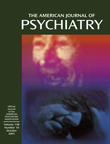A Review and Meta-Analysis of the Genetic Epidemiology of Anxiety Disorders
Abstract
OBJECTIVE: The authors conducted meta-analyses of data from family and twin studies of panic disorder, generalized anxiety disorder, phobias, and obsessive-compulsive disorder (OCD) to explore the roles of genetic and environmental factors in their etiology. METHOD: MEDLINE searches were performed to identify potential primary studies of these disorders. Data from studies that met inclusion criteria were incorporated into meta-analyses that estimated summary statistics of aggregate familial risk and heritability for each disorder. RESULTS: For family studies, odds ratios predicting association of illness in first-degree relatives with affection status of the proband (disorder present or absent) were homogeneous across studies for all disorders. The calculated summary odds ratios ranged from 4 to 6, depending on the disorder. Only for panic disorder and generalized anxiety disorder could the authors identify more than one large-scale twin study for meta-analysis. These yielded heritabilities of 0.43 for panic disorder and 0.32 for generalized anxiety disorder. For panic disorder, the remaining variance in liability could be attributed primarily to nonshared environment. For generalized anxiety disorder, this was true for men, but for women, a potentially significant role for common familial environment was also seen. CONCLUSIONS: Panic disorder, generalized anxiety disorder, phobias, and OCD all have significant familial aggregation. For panic disorder, generalized anxiety disorder, and probably phobias, genes largely explain this familial aggregation; the role of family environment in generalized anxiety disorder is uncertain. The role of nonshared environmental experience is significant, underscoring the importance of identifying putative environmental risk factors that predispose individuals to anxiety.



